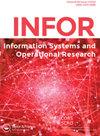Online cash-back shopping with network externalities
IF 1.6
4区 计算机科学
Q4 COMPUTER SCIENCE, INFORMATION SYSTEMS
引用次数: 4
Abstract
Abstract Along with the popularity of online shopping, the cash-back industry is witnessing dramatic development. Under this backdrop, retailers who sell products with network externalities make different decisions about affiliating with cash-back sites. In this paper, we set up a cash-back model considering network externalities. Our goal is to identify the condition under which it is profitable for retailers whose products exhibit network externalities to affiliate with a cash-back site and to find out the driving force of the profitability. We find that only when there are more low-type consumers than high-type consumers and the degree of network externalities is lower than a certain threshold is it profitable for such a retailer to affiliate with an independent cash-back site, because the cash-back rate is decreasing in the intensity of network externality. It is the price discriminative effect instead of the promotive effect that makes it profitable. We show that the double-marginalization problem between the retailer and an independent cash-back site leads to the cash-back paradox where all consumers pay more for the product in the presence of a cash-back channel. We also show that when the retailer affiliates with two cash-back sites, each site has the incentive to lower the cash-back rate to take advantage of network externalities, which makes the cash-back paradox more likely to happen and makes it less likely for a retailer to benefit from cash-back channels. Furthermore, we suggest the retailer establish his own cash-back channel. Our work provides implications for retailers as well as for cash-back sites and consumers.网络外部性下的在线返现购物
随着网上购物的普及,现金返还行业得到了迅猛的发展。在这种背景下,销售具有网络外部性产品的零售商在与现金返还网站合作的问题上做出了不同的决定。在本文中,我们建立了一个考虑网络外部性的现金返还模型。我们的目标是确定在何种条件下,产品表现出网络外部性的零售商与现金返还网站相关联是有利可图的,并找出盈利能力的驱动力。我们发现,只有当低类型消费者比高类型消费者多,并且网络外部性程度低于一定阈值时,零售商才会与独立的现金返还网站合作是有利可图的,因为现金返还率随着网络外部性的强度而降低。是价格歧视效应而不是促销效应使其有利可图。我们证明了零售商和独立现金返还网站之间的双重边缘化问题导致现金返还悖论,即在存在现金返还渠道的情况下,所有消费者都为产品支付更多费用。我们还表明,当零售商与两个现金返还网站相关联时,每个网站都有动机降低现金返还率以利用网络外部性,这使得现金返还悖论更有可能发生,并使零售商更不可能从现金返还渠道中受益。此外,我们建议零售商建立自己的现金返还渠道。我们的研究为零售商、现金返还网站和消费者提供了启示。
本文章由计算机程序翻译,如有差异,请以英文原文为准。
求助全文
约1分钟内获得全文
求助全文
来源期刊

Infor
管理科学-计算机:信息系统
CiteScore
2.60
自引率
7.70%
发文量
16
审稿时长
>12 weeks
期刊介绍:
INFOR: Information Systems and Operational Research is published and sponsored by the Canadian Operational Research Society. It provides its readers with papers on a powerful combination of subjects: Information Systems and Operational Research. The importance of combining IS and OR in one journal is that both aim to expand quantitative scientific approaches to management. With this integration, the theory, methodology, and practice of OR and IS are thoroughly examined. INFOR is available in print and online.
 求助内容:
求助内容: 应助结果提醒方式:
应助结果提醒方式:


